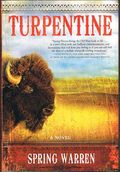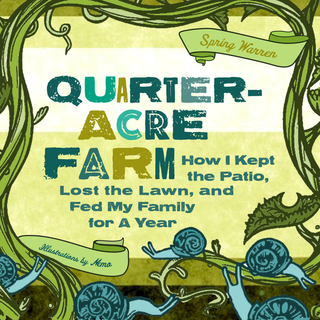Spring Warren is the author of Turpentine and most recently, The Quarter-Acre Farm: How I Kept the Patio, Lost the Lawn, and Fed my Family for a Year. Today, she stops by my blog to tell the story of her path to publication.
 I spent a couple of years after graduate school not only writing a novel, but also writing query letters trying to interest some publisher, some agent, some anybody in my work. I’d send out half a dozen letters, then over the next months watch the form letters dribble in, all of which said sorry but they weren’t taking any new clients/reading any new work/interested in what I was doing.
I spent a couple of years after graduate school not only writing a novel, but also writing query letters trying to interest some publisher, some agent, some anybody in my work. I’d send out half a dozen letters, then over the next months watch the form letters dribble in, all of which said sorry but they weren’t taking any new clients/reading any new work/interested in what I was doing.
I didn’t care much for this process. Not only did I feel like I was constantly volunteering my chest for the plunging sword of rejection, but the combination of investigating editors, agents, publishers and then crafting the letters to them, made for days and days of tedium that felt, increasingly, like wasted effort.
To make matters worse, the few houses that did respond to my queries and which then read my novel all said pretty much the same thing – the writing was good but that it was almost impossible to sell “quiet character novels” written by unknown authors.
I read “quiet” to mean boring.
I started another novel and I swore no one would call it quiet. I put big characters in it who got blown up, shot at, trampled by buffalo, hanged, drowned, and who fell disastrously in love.
I also stopped sending query letters to presses. I decided that I would focus on finding an agent. If I got an agent, I reasoned, not only would this agent provide me with a better chance of being published, but the agent would also be in charge of the query work (and hopefully be much, much, much better at it than I was) and I would be free to spend my time writing fiction. 
I’m not so sure that was such a good plan, as I had no publications. No short stories or essays in print doesn’t exactly inspire confidence among those who print things. Luckily, about the time I’d decided to curtail my query writing I won the inaugural Maurice Prize, an award for the “best unpublished novel by a UC Davis alum.” I was then able to contact agents with this feather in my cap. Two of those agents were willing to represent me. After speaking to both of them I chose the agent who was sharp and funny and sounded like Julie Andrews (I had visions of her as Mary Poppins pulling my novels out of her carpet bag in front of gawping New York editors).
My agent was all I dreamed of. She busily prepared to send out my Maurice winning novel about the time I finished my “unquiet” novel, Turpentine. When my agent read Turpentine she put the prize-winner aside and began sending out the new (and unquiet) work.
Within a couple of months my agent had two houses that wanted to buy Turpentine. They each offered the same amount of money. Then they each went up a smidge – the same smidge – to the penny. I talked to both editors on the phone. I liked both editors. This should have been delightful.
I was miserable. There was no easy choice. There wasn’t even a charming accent to consider. I was afraid I would certainly make a big mistake when deciding between the two houses.
The best advice I got was from the novelist John Lescroart, who said the worst thing that can happen to a book is for the editor to leave the publishing house and “orphan” your book. He recommended I choose the house where this is least likely to happen. I did just that, and Turpentine was published by Grove Atlantic Books where it was edited by Morgan Entrekin – who also owned the company. The other editor did indeed take a job at another house within the year, by the way.
Two years later I sold my second book. I’d heard that it is harder to get the second book published than the first, but my agent, once again, did most of the hard work. Not the worrying, however, which I am so good at it would be a crime to delegate. I was growing most of my food in my suburban yard that year and my husband had doubted I could do so. I was talking to my agent at some point about it and telling her that in spite of all my errors and ignorance about farming and my husband’s nay-saying I was quite sure I was going to be able to finish the year not only feeding myself, but the family as well. My agent was intrigued with the story and then said she thought it could be a great book, and that I should write up a proposal. It took a few months to sell the book, but The Quarter Acre Farm; how I kept the patio, lost the lawn, and fed my family for a year is out with Seal Press now.
I am surprised at how easy it sounds. I got published twice in only a dozen or so paragraphs! It didn’t seem so easy when I was going through it, however; not the first time nor the second. I suspect trying to get published the third time won’t be a cakewalk either. My best bet in dealing with the process is to sidestep the feelings of rejection and doubt while hoping for the happy phone call that a book has been sold by not waiting. Instead, I start another book. When I am immersed in the new project, the book that is making the rounds ceases to feel so consuming and I can remember the part of being a writer that I really like – the writing.